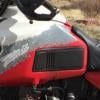Patrbukley, I have a 2016 Grandby too. You mentioned that around 25F you would empty all water from the camper system. I have never worried about freezing water lines or water in spare 5 gal water containers left outside unless it gets down to below 19F. I try to not fill water containers to full, maybe couple of inches below the top spout. If it did freeze, only a bit of ice will easily melt when the sun comes up.
As far as your furnace cycling times, that is a lot of in/off time through out a long winter night. I would worry about running down the batteries and not getting a good night sleep hearing the noisy furnace fan. I am really glad to have a Wave 3 heater. It won’t keep you too warm at 15F by itself, but it cuts down the furnace cycling through the long nights. Wave 3 seems more miserly in gas usage too. Furnace does heat up the camper quickly and much needed in the hours before sunrise, when the coldest temperature of the night occur, usually.
I use a inside/outside digital thermometer that helps me prevent freezing lines. Another tip is never trust a weather report. Plan and expect forecasts to vary 10-15F lower. If it gets down to 0F, I rather go lower in elevation or go home.
Hi Muttmaster,
My logic on the temp is as follows;
In montana one night the thermometer said 21 degrees and my faucet at the line coming in froze and cracked. I replaced it with a better stainless kitchen faucet which was an upgrade.
Here in the Misquito range one night the temp said 17 and during the next day the outside faucet/shower which we had been using getting mud off after we had gotten in a muddy creek building a walkway/bridge for someone....the female portion of the fitting cracked which wasnt discovered till later coming through the cabinet under the sink. And yes we left the little door to the shower open. Yet there have also been times at 15 at Lake Granby (ironically) and none of my stuff froze.
With these two experiences I feel telling people 25 and below you are entering a risky area is a true statement. When people say to me; "Oh Ive been in 10 degrees and nothing happend" I say great, keep doing it. But on the inside I always think of the person that says "Oh you can cross the street with your eyes closed....I did it and nothing happend". So to each his own, I am simply stating my personal experiences, not gospel, just mine.
Sounds like the heater you are using is a good one. Thats great. I agree with you, my cycling time seems excessive but I suspect there is an exponential relationship with temperature drop and insulating ability of the FWC's.
In other wods, I bet when it's 50 outside it can keep it at 60 easier than when its 0 outside keeping it at 10. I don't know if I'm explaining that concept correctly but hopefully you get my point.
Thanks for the feedback.
Edited by patrkbukly, 22 December 2020 - 06:03 PM.














